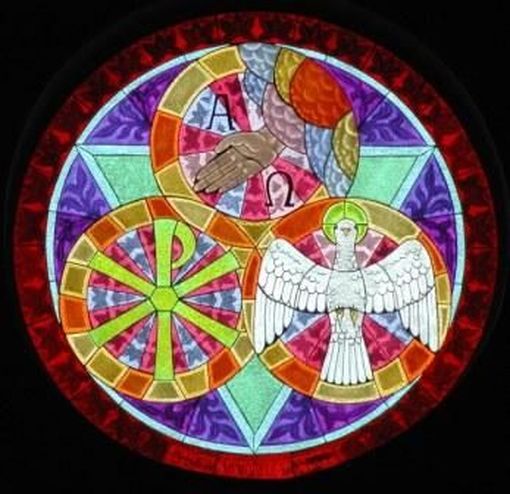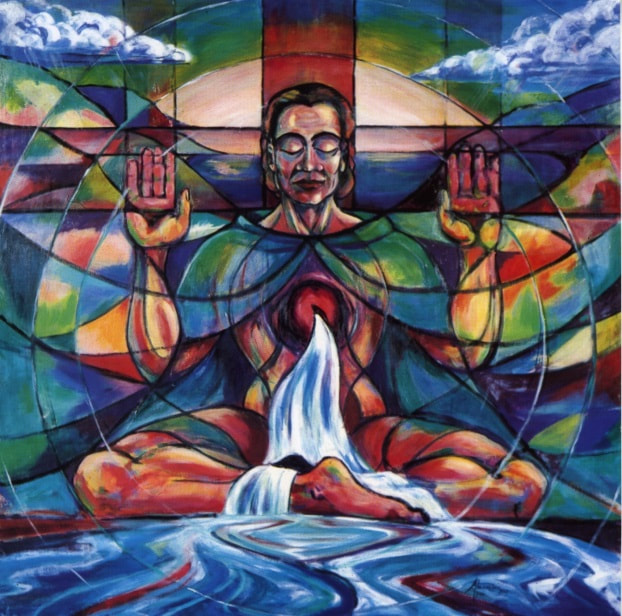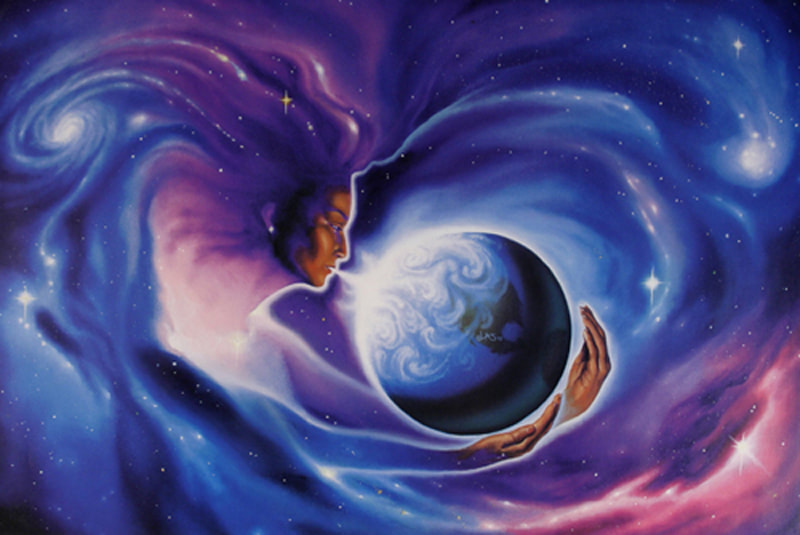We believe in the
Holy Trinity,
The God revealed in the
sacred narrative of Israel
and the
Life, Death & Resurrection
of
Jesus Christ:
THE DIVINE CREATOR,
THE LIVING WORD,
THE SPIRIT OF LIFE.
THE DIVINE CREATOR
We believe in the eternal Divine Being, infinite is wisdom, power, and love:
the Creator of all that exists – seen and unseen.
We come to this belief through the prophetic life of the people of God,
brought to quintessential expression
in the person of Jesus Christ,
to whom his Body, the Church, bears witness in the Resurrection Age.
The story of Israel, Jesus, and the Body of Christ is a narrative
which points to a reality
confirmed for us in our experience of the natural world:
in the grandeur and incomprehensible complexity of the universe,
and the power of love to overcome suffering,
we sense the presence of a
Divine Initiative.
We look outside of ourselves and realize that the universe,
which includes we who call ourselves human,
is something too beautiful and too improbable to be random.
In other words, the first thing we believe about God is that
God exists and God creates.
the Creator of all that exists – seen and unseen.
We come to this belief through the prophetic life of the people of God,
brought to quintessential expression
in the person of Jesus Christ,
to whom his Body, the Church, bears witness in the Resurrection Age.
The story of Israel, Jesus, and the Body of Christ is a narrative
which points to a reality
confirmed for us in our experience of the natural world:
in the grandeur and incomprehensible complexity of the universe,
and the power of love to overcome suffering,
we sense the presence of a
Divine Initiative.
We look outside of ourselves and realize that the universe,
which includes we who call ourselves human,
is something too beautiful and too improbable to be random.
In other words, the first thing we believe about God is that
God exists and God creates.
The second thing we take from the story of Jesus is that
God creates because God is Love.
The Divine Being does not need us,
but creates the human being – and all life – for relationship:
In the act of creation, God decides not to be without us.
To fulfill this desire for relationship with the Creation,
the Divine Being expresses itself through the power of its
Spirit and Creative Logic, the Living Word.
God creates because God is Love.
The Divine Being does not need us,
but creates the human being – and all life – for relationship:
In the act of creation, God decides not to be without us.
To fulfill this desire for relationship with the Creation,
the Divine Being expresses itself through the power of its
Spirit and Creative Logic, the Living Word.
THE BEGOTTEN & INCARNATE
LOGIC OF GOD:
THE LIVING WORD
|
When God began to create the heavens and the earth,
the earth was a formless void and darkness covered the face of the deep, while the wind from God swept over the face of the waters. THEN GOD SPOKE, “Let there be light!” and there was light. God saw that the light was good; and God separated the light from the darkness. (Genesis 1:1-4) |
In the beginning was the LOGOS, and the LOGOS was with God, and the LOGOS was God. He was in the beginning with God.
All things came into being through him, and without him not one thing came into being. What has come into being in him was life, and the life was the light of all people. The light shines in the darkness, and the darkness did not overcome it. (John 1:1-5) |
In the ancient Tradition of the followers of Jesus, we believe that he is the Creator of the Universe in person. LOGOS is the Greek word that means "logic", and from the very beginning of the church's witness, it testified that the Creative Logic of the Divine Being had expressed itself in the person of Jesus. This presents a mystery which cannot be fully explained, but which can be fully experienced. Those early followers of Jesus who witnessed his life, death, and resurrection experienced him as The Christ, the Anointed One of God. Jesus' way of being human convinced his disciples that he was also divine. We may say, then, that the Incarnate God, Jesus Christ, did not come among humans to start a new religion, but to teach us how to live so that our own sacred worth and power might be revealed. All of the written documents produced by the Church, beginning with the Holy Scriptures of the New Testament, are an attempt to explore, narrate, and convey the experience of this mystery.
Specifically then there is a crisis for humans living in the technological age: experiencing the faith of Jesus – the faith by which he himself lived – requires that the heart, intuition, and imagination of the human creature go where the intellect cannot follow. Belief in Jesus is a risk because it constitutes a loss of control and an exploration of existence beyond the confines of mere scientific fact. In the end, it requires a complete surrender to what seems impossible to the waking mind.
We believe that the Creative Logic of God, personified in Jesus of Nazareth, teaches us this surrender through the giving and receiving of love. In the acts of loving and being loved, human beings find the hope, strength, insight, and courage to live sacred lives... that is... lives that flourish and generate peace. In the person of Jesus Christ, we believe that the Divine Creator of the Universe has walked among human beings in order to teach us how to help bring the divine creative initiative to its completion. In Jesus Christ, humanity has been invited to participate with God in the renewal and reconciliation of the cosmos. Perfection in creation is not necessarily something that lies behind us, but perhaps remains something that has yet to be.
Specifically then there is a crisis for humans living in the technological age: experiencing the faith of Jesus – the faith by which he himself lived – requires that the heart, intuition, and imagination of the human creature go where the intellect cannot follow. Belief in Jesus is a risk because it constitutes a loss of control and an exploration of existence beyond the confines of mere scientific fact. In the end, it requires a complete surrender to what seems impossible to the waking mind.
We believe that the Creative Logic of God, personified in Jesus of Nazareth, teaches us this surrender through the giving and receiving of love. In the acts of loving and being loved, human beings find the hope, strength, insight, and courage to live sacred lives... that is... lives that flourish and generate peace. In the person of Jesus Christ, we believe that the Divine Creator of the Universe has walked among human beings in order to teach us how to help bring the divine creative initiative to its completion. In Jesus Christ, humanity has been invited to participate with God in the renewal and reconciliation of the cosmos. Perfection in creation is not necessarily something that lies behind us, but perhaps remains something that has yet to be.
"Rivers of Eden" by Yoram Raanan
THE SPIRIT OF LIFE
"Ruach" by Lucy Synk
GOD'S ANIMATING BREATH
In the Hebrew scriptures, the Spirit is referred too primarily as the Ruach of God - the "breath" or "wind" of God. We see this in the quote above from Genesis: When God began to create the heavens and the earth, the earth was a formless void, and darkness covered the face of the deep, while the wind from God swept over the face of the waters. From the very beginning, the Spirit animates the form given to the creation by God's Creative Logic (Jesus). In other words, without the Spirit nothing moves – – –
In the narrative of Israel, the Spirit is also the person who communicates with human beings through the inspiration of those who became God's messengers: the Prophets of Israel. One of the great examples of this inspiration is recorded in the Book of the Prophet Isaiah (61), which is also quoted by Jesus at the beginning of his public ministry (Luke 4):
In the narrative of Israel, the Spirit is also the person who communicates with human beings through the inspiration of those who became God's messengers: the Prophets of Israel. One of the great examples of this inspiration is recorded in the Book of the Prophet Isaiah (61), which is also quoted by Jesus at the beginning of his public ministry (Luke 4):
The RUACH of the Lord God is upon me,
because the Lord has anointed me;
he has sent me to bring good news to the oppressed,
to bind up the brokenhearted, to proclaim liberty to the captives,
and release to the prisoners;
to proclaim the year of the Lord’s favor,
and the day of vengeance of our God; to comfort all who mourn;
to provide for those who mourn in Zion--
to give them a garland instead of ashes,
the oil of gladness instead of mourning,
the mantle of praise instead of a spirit of despair.
because the Lord has anointed me;
he has sent me to bring good news to the oppressed,
to bind up the brokenhearted, to proclaim liberty to the captives,
and release to the prisoners;
to proclaim the year of the Lord’s favor,
and the day of vengeance of our God; to comfort all who mourn;
to provide for those who mourn in Zion--
to give them a garland instead of ashes,
the oil of gladness instead of mourning,
the mantle of praise instead of a spirit of despair.
This text leads us to an understanding of the Spirit as the Divine Person who teaches us the love and justice of a God who never forsakes the poor, the prisoner, and the oppressed. If God creates because God is Love, this love is eternal and defines God's relationship with the creation. Much remains broken in creation, so when John the Baptist comes from the wilderness of Judea to baptize at the River Jordan, he proclaims: “I baptize you in water for repentance, but one who is more powerful than I is coming after me; I am not worthy to carry his sandals. He will baptize you in the Holy Spirit and fire. His winnowing fork is in his hand, and he will clear his threshing floor and will gather his wheat into the granary; but the chaff he will burn with unquenchable fire.”
God's love burns out of our lives all the ways we harm ourselves, others, and the rest of creation. God's love is a refining fire, and Jesus baptizes us in this fire by the power of the Spirit. If the Spirit is always moving the creation towards life, then it is the Spirit's task to remove from us those parts of our physical, emotional, and spiritual existence that do not give life. Sometimes this is a painful process, where the honesty of repentance brings us to profound lament. But God's love always restores what is broken and transforms it into something beautiful. The Spirit of Life works this transformation in the lives of human beings, stirring our hearts and minds with the Fire of God's Love.
God's love burns out of our lives all the ways we harm ourselves, others, and the rest of creation. God's love is a refining fire, and Jesus baptizes us in this fire by the power of the Spirit. If the Spirit is always moving the creation towards life, then it is the Spirit's task to remove from us those parts of our physical, emotional, and spiritual existence that do not give life. Sometimes this is a painful process, where the honesty of repentance brings us to profound lament. But God's love always restores what is broken and transforms it into something beautiful. The Spirit of Life works this transformation in the lives of human beings, stirring our hearts and minds with the Fire of God's Love.
THE REFINING FIRE
OF GOD'S LOVE
Present throughout the narrative of God's relationship with the People of Israel, the presence and power of the Spirit of Life is most dramatically portrayed in the story of Jesus of Nazareth, whom Christians understand to be the Messiah of Israel: the high priest, prophet, and master of the People of God. Nothing happens in Jesus' story without the power and work of the Spirit of Life. From the Incarnation of the Living Word in the womb of the Virgin Mary; to the anointing of Jesus at his baptism; to the power which flows through Jesus in deeds and words of healing, forgiveness, and love; and the raising of Jesus from the dead; the Spirit remains the vital connection between the Son of Man and the Divine Creator. Now, as all things are being made new, the Spirit fills an Easter People with an eternal peace, and anoints the Church with power to proclaim the Good News that, in Jesus Christ, death is overcome.






